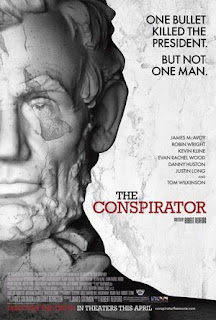The Conspirator
 It was somewhat exciting to see The Conspirator in a theater just a few hundred feet away from the house where Abraham Lincoln slept the night before he gave the Gettysburg Address. As such, the history was palpable. Unfortunately the film, directed by Robert Redford, never really breaks free of its overly didactic style to present an interesting narrative film. In many ways it plays like an above-average History Channel docudrama, and one keeps expecting the word "Dramatization" to appear beneath the acted scenes.
It was somewhat exciting to see The Conspirator in a theater just a few hundred feet away from the house where Abraham Lincoln slept the night before he gave the Gettysburg Address. As such, the history was palpable. Unfortunately the film, directed by Robert Redford, never really breaks free of its overly didactic style to present an interesting narrative film. In many ways it plays like an above-average History Channel docudrama, and one keeps expecting the word "Dramatization" to appear beneath the acted scenes.The film is the story of Mary Surratt, (Robin Wright) who was arrested for conspiring to kill Abraham Lincoln. She owned a boardinghouse where the conspirators, including John Wilkes Booth, met and hatched their plot (I think many Americans don't know that the full plan was not only to kill Lincoln, but also Vice-President Johnson and Secretary of State Seward. Johnson was left unharmed when his potential assassin got drunk and chickened out, but Seward was savagely attacked, though he survived).
Surratt's guilt or innocence, which is still debated today (from what I've read she was guilty) isn't at the heart of Redford's film (written by James Solomon). He's more interested in the shabby justice she received, and it's here that it becomes clear that Redford is probably less interested in Surratt than with events in the U.S. following the attacks on 9/11.
The central character is a young, untested lawyer, played by James McAvoy (in yet another of his performances where he plays the bland center of a film, as he did in The Last King of Scotland and The Last Station). He is recruited to defend Surratt at the urging of a Maryland senator (well-played by Tom Wilkinson). He is reluctant, both by the nature of the crime and in realizing it won't exactly help his career. But, as he begins the trial, which is a military tribunal, he comes to understand how Surratt is getting a raw deal. In a military trial, a defendant can not testify for themselves, and there are no rules of discovery. The deck is stacked, especially when Secretary of War Edwin Stanton (played villainously by Kevin Kline) wants a quick conviction.
It is a scene between McAvoy and Kline that should be labeled "author's message." McAvoy points out that Kline is governing by using fear that more acts of terror may come. He might as well be talking to Donald Rumsfeld about The Patriot Act and orange terror-level alerts. That the film has come out right after the decision to try Khalid Sheik Mohammed at Guantanamo only perpetuates the parallels.
Beyond all the history, The Conspirator doesn't ever really emotionally engage the audience. Surratt, played well by Wright, but mostly in one-note, is not painted as a martyr, in that her guilt or innocence is not established. McAvoy, I suppose, is supposed to be the guy we have empathy for, as he loses friends, prestige, and even his girl (Alexis Bledel), but he's just not that interesting enough to hang the whole film on.
The film is also over-directed by Redford, who doesn't miss an opportunity to italicize a moment. He's aided and abetted by his cinematographer, Newton Thomas Sigel, who can't resist scenes where bright sunlight comes spilling into a darkened room.
For those just interested in the history, I recommend the film, as it hews pretty close to the facts. There are discrepancies--the defense actually called 31 witnesses, when it appears in the film that only two were called. It also doesn't do much for Stanton, who for years was sullied by a untrue account by a German historian that he was involved in the conspiracy. I guess he may been innocent of that, but was still guilty of being an asshole.
My grade for The Conspirator: C


Comments
Post a Comment